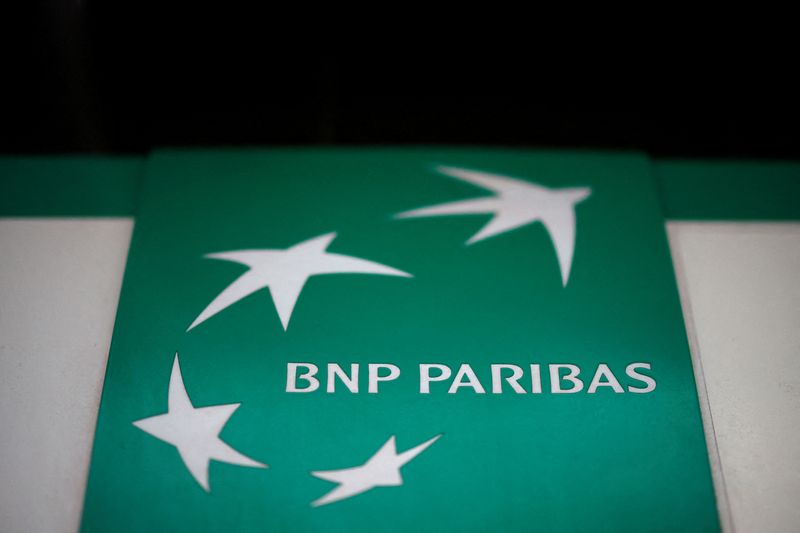By Mathieu Rosemain, Tom Sims and Valentina Za
PARIS/FRANKFURT/MILAN (Reuters) -The euro zone's biggest banks largely beat second quarter earnings expectations on Wednesday, benefiting from still-high interest rates and bumper investment banking business, although concerns about a tougher outlook held back their shares.
European banking shares, pinned lower for a decade by poor profitability when central bank interest rates were stuck at zero, have risen 20% since January and trade near nine-year highs.
On Wednesday, the STOXX Europe 600 Banks index was down 0.5% by 1510 GMT after a raft of bank earnings fed into analyst and investor concerns about the sustainability of the sector's profit growth.
Germany's Deutsche Bank bucked the general trend with a quarterly loss related to a previously flagged provision for a lawsuit linked to its troubled Postbank unit. But the surprise was it axing plans for another buyback and a rise in bad loan loss charges, sending its stock down 7%.
BNP Paribas (OTC:BNPQY)'s revenue and profits exceeded analyst expectations thanks to a blow-out quarter for its equities traders - mirroring the equities boom among Wall Street banks - and a jump in revenue at its overall investment bank division.
The French lender's more than 11.2 billion euros ($12.2 billion) net profit target should be "well exceeded", said Tarik El Mejjad, an analyst at Bank of America.
BNP's shares wobbled, however, amid concerns about weakness at its retail unit, where net interest income (NII) - a closely watched measure of how much a bank earns from loans minus how much it pays on deposits - fell 11% before the European Central Bank has really got going with rate cuts.
Ratings agency Moody's (NYSE:MCO) expects the very strong net interest income numbers reported by Santander (BME:SAN) and UniCredit "to have mostly peaked", said Olivier Panis, an associate managing director.
"Risk charges are rising at Deutsche and BNP. Although risk provisions are very low at UniCredit, we now expect them to increase in next quarters," while still remaining low, Panis added.
Rising profits and pledges of more than 120 billion euros in shareholder payouts have helped improve investor sentiment over the last year, yet most lenders still trade below their tangible book value - a sign of concern about profit sustainability, analysts say.
Santander, the second-largest euro zone bank by market value after BNP, reported a record net profit, up 20% year-on-year and in line with forecasts thanks to solid results in Spain and Brazil.
The bank's NII came in weaker than expected but it upped its profitability goals.
CEO Hector Grisi said the bank was trying to "carefully manage margins" in today's favourable environment of higher for longer European rates.
Italian lender UniCredit's profit topped forecasts as it announced it was buying a Belgian digital bank with its own cloud-based IT platform.
The bank, which has seen its shares soar 72% in 12 months thanks to CEO Andrea Orcel's decision to return nearly all profits to shareholders in buybacks and dividends, reported a small fall in quarterly revenues but stood by its 2024 profit goal. Its shares fell nearly 3% before recovering.
On Thursday, Britain's Lloyds Banking Group (LON:LLOY) kicks off UK banks' earnings, while next week sees France's Societe Generale (OTC:SCGLY) and Credit Agricole (OTC:CRARY) and Spain's BBVA (BME:BBVA) among the other big euro zone lenders give updates.
Investors will be watching closely for the NII outlook and how quickly lending margins are likely to come under pressure in the coming quarters.
INVESTMENT BANKING BOOST
For BNPP and Deutsche, a strong showing at their investment banking divisions helped offset weakness elsewhere.
Volatile investment bank earnings have long been a distraction for European banks and a source of displeasure for shareholders, but soaring advisory fees and a rebound in capital markets activities has helped diversify revenue streams in recent quarters.
The investment bank looks set to remain Deutsche Bank's biggest division by revenue in the coming years and last quarter was aided by a near doubling in advisory revenues. The bank, however, missed out on the jump in equities trading after exiting that business several years ago.
At BNPP, revenue from equities trading and prime brokerage services jumped 58%.
Still, the performance at both banks lagged their Wall Street peers, which saw an average 16% jump in investment bank revenues, according to Jefferies, against 12% at BNPP and 10% at Deutsche.

A strongly performing U.S. economy has sparked a wave of dealmaking and capital markets activity in the U.S., with volumes in Europe more subdued.
($1 = 0.9206 euros)